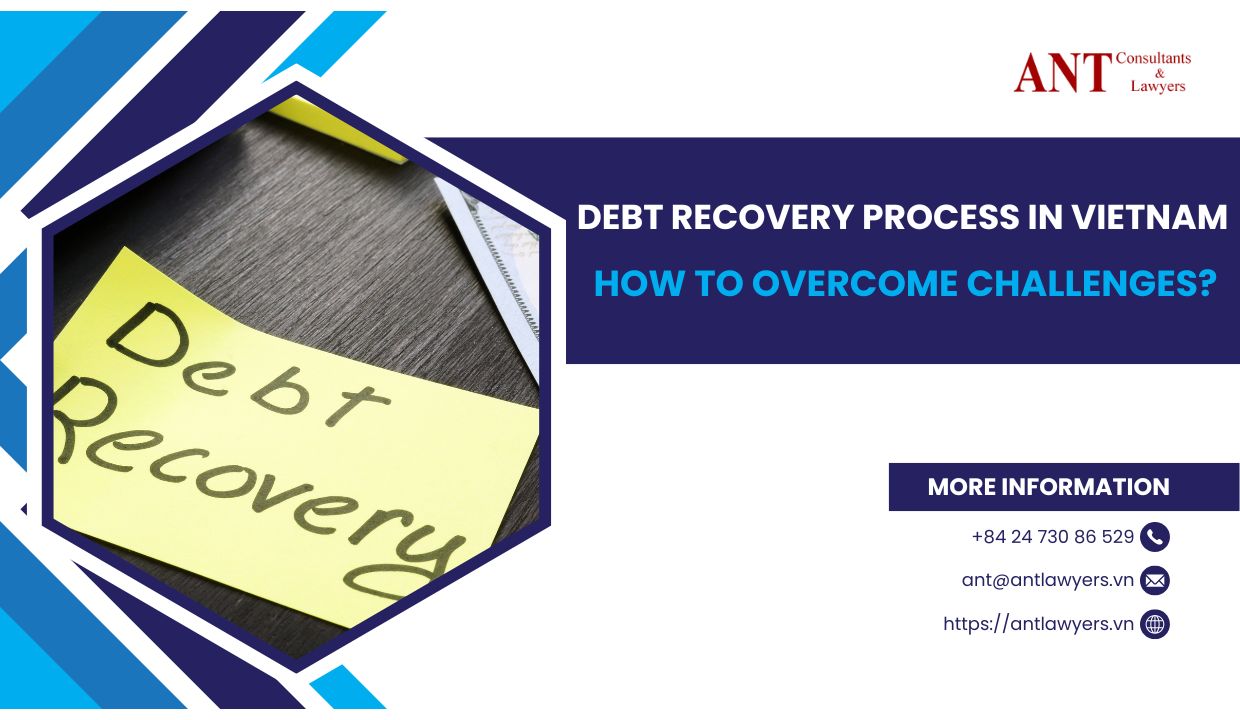Debt Recovery Process in Vietnam: How to Overcome Challenges?


Debt_Recovery_Process_in_Vietnam
The debt recovery process in Vietnam is challenging as any other countries in Southeast Asia. As Vietnam continues to attract foreign investment due to its rapid growth and strategic location, many businesses face difficulties when dealing with unpaid debts.
We need to first agree, each country is different. One can not apply the similar approach in debt recovery in one country to another country, especially a country with different cultures, business practice, legal environment, state of development of the economic situation.
When it comes to Vietnam, understanding legal and cultural frameworks is essential for overcoming these issues. A successful debt recovery strategy not only protects financial interests but also ensures a harmonious relationship with local partners.
In the following, we will discuss the aspects of the debt recovery process in Vietnam, offering foreign businesses a roadmap to address such challenges effectively.
Legal System To Support Debt Recovery Process in Vietnam
The Vietnamese legal system provides a framework for debt recovery, but it requires familiarity to utilize it effectively.
The Civil Code, Commercial Law, and the Law on Enforcement of Civil Judgments form the backbone of the legal processes involved.
Article 466 of the Civil Code 2015, for instance, explicitly mandates debtors to fulfill their contractual repayment obligations, offering a clear legal basis for pursuing debts.
The law also empowers creditors to claim interest on overdue payments, ensuring compensation for financial losses caused by delays.
These regulations provide confidence to foreign businesses that their claims are supported by Vietnamese law.
Navigating Cultural Sentitivities in Debt Recovery Process in Vietnam
While the legal framework is robust, cultural considerations play a significant role in the debt recovery process in Vietnam.
Local norms prioritize preserving relationships and maintaining harmony, which can pose a challenge for businesses accustomed to more assertive approaches in other markets.
Direct confrontation or overly aggressive debt recovery methods may harm a company’s reputation and hinder future business opportunities.
Understanding and respecting these cultural nuances can significantly improve recovery outcomes.
For example, mediation is often preferred over litigation as it aligns with Vietnamese cultural values, allowing disputes to be resolved amicably and relationships preserved.
Key Stages in the Debt Recovery Process in Vietnam
The debt recovery process in Vietnam typically progresses through several stages.
Initial efforts focus on informal methods such as friendly reminders.
These early communications, often through calls or emails, are aimed at resolving issues without conflict.
If informal approaches fail, formal notices are issued, citing legal obligations under Article 466 of the Civil Code 2015. These notices serve as a warning and indicate that legal action may follow if the debtor does not comply.
Negotiation and mediation are the next logical steps, often yielding favorable outcomes for both parties. Vietnamese law encourages voluntary compliance, making mediation an effective and culturally appropriate strategy.
When informal and mediated solutions prove insufficient, creditors may resort to litigation. Vietnam’s Civil Procedure Code 2015, provides a clear mechanism for filing lawsuits in Vietnam. Courts require creditors to present evidence such as signed contracts or invoices to substantiate their claims.
While the judicial system offers a structured pathway for debt recovery, foreign businesses should be prepared for potential delays due to procedure challenges.
However, once a favorable ruling is obtained, the focus shifts to enforcement. The Law on Enforcement of Civil Judgments outlines methods such as asset seizures or wage garnishment to ensure compliance with court rulings. These enforcement measures are crucial for achieving the final resolution of outstanding debts.
Challenges in Enforcing Debt Recovery Process in Vietnam
Despite the clarity of the legal framework, foreign businesses may encounter challenges in executing the debt recovery process in Vietnam. There could be many potential pitfalls along the way which which can delay case resolutions and enforcement.
Locating uncooperative or evasive debtors is another frequent issue, often requiring specialized expertise and local knowledge. Cross-border complexities further compound these challenges, as differences in legal systems and business practices can hinder smooth proceedings. Additionally, Vietnam’s underdeveloped credit reporting infrastructure limits the availability of reliable financial information on debtors, making it difficult to assess their repayment capacity.
Practices for Overcoming Debt Recovery Challenges
Addressing these challenges requires a strategic approach. Conducting thorough credit assessments before entering into agreements is an essential first step. Businesses should incorporate their own due diligence processes.
Comprehensive contracts that clearly define payment terms, penalties, and dispute resolution mechanisms offer another layer of protection. Under the law, creditors have the right to demand repayment, and a well-drafted contract strengthens their position in disputes.
Engaging local experts is another critical element in overcoming debt recovery challenges. Legal professionals and debt collection agencies with in-depth knowledge of Vietnamese laws and practices can provide invaluable support. Their expertise ensures that all actions are compliant with local regulations, reducing the risk of complications.
The Role of Mediation in Debt Recovery Process in Vietnam
Mediation remains a cornerstone of the debt recovery process in Vietnam. Encouraged by both cultural norms and legal provisions, mediation enables parties to resolve disputes without resorting to litigation. This approach not only saves time and resources but also fosters goodwill, preserving relationships that may be vital for future business. Mediated agreements often involve restructuring repayment terms or waiving certain penalties, creating a win-win situation for both creditors and debtors.
Future of Challenges of Doing Business in Vietnam Relevant to Debt Recovery
We know that, from administration and governance’s perspective, the country will need to adapt to fix challenges to support the growth of economy and attract foreign investors doing business in Vietnam. Ongoing reforms aim to enhance the efficiency of judicial proceedings and enforcement mechanisms, addressing some of the common challenges faced by creditors. As Vietnam continues to integrate with global trade networks, its legal system is expected to becoming more transparent and aligned with international standards, further bolstering confidence among foreign investors.
Conclusion
The debt recovery process in Vietnam is undeniably complex, but it also presents significant opportunities for businesses willing to invest the effort required to understand its nuances. By navigating the legal framework effectively, adopting culturally sensitive strategies, and leveraging local expertise and technology, foreign businesses can overcome challenges and safeguard their financial interests. A successful debt recovery strategy in Vietnam is not just about recovering money; it is also about building trust and fostering long term partnerships in Vietnam.
About ANT Lawyers, a Law Firm in Vietnam
We help clients overcome cultural barriers and achieve their strategic and financial outcomes, while ensuring the best interest rate protection, risk mitigation and regulatory compliance. ANT lawyers has lawyers in Ho Chi Minh city, Hanoi, and Danang, and will help customers in doing business in Vietnam.
How ANT Lawyers Could Help Your Business?
Please click here to learn more about ANT Lawyers Debt Recovery or contact our lawyers in Vietnam for advice via email ant@antlawyers.vn or call our office at +84 28 730 86 529
Recent Posts
5 Crucial Facts About ESG Laws in Vietnam That Could Save Your Business and Reputation
The Business World Is Changing Fast Rules are shifting. Expectations are rising. Eyes are watching. …
7 Powerful Reasons Why ESG Compliance in Vietnam Will Win You Trust, Growth, and Global Clients
Trust matters. Today, more than ever. Across industries, many companies are now being asked. directly…
7 Bold Reasons Why Tokenization in Vietnam Could Transform Your Future
Change is coming. Quietly. Digitally. Rapidly. Let’s imagine the situation, which assets are no longer…
Vietnam P2P Lending: 5 Bold Reasons Why Decree 94/2025 Could Empower Millions or Backfire?
A New Financial Chapter Begins in Vietnam One person lends. Another borrows. It’s that simple.…
5 Essential Lessons from Risk Management in Digital Assets in Vietnam: Protecting Trust in a Digital World
Trust Is the Real Currency Money can be lost. Tokens can vanish. Platforms can crash.…
5 Powerful Reasons Why Vietnam Digital Asset Sandbox Is a Bold and Hopeful Move for Innovation
Change is fast. Rules are slow. But innovation can’t wait. As digital assets grow, so…




